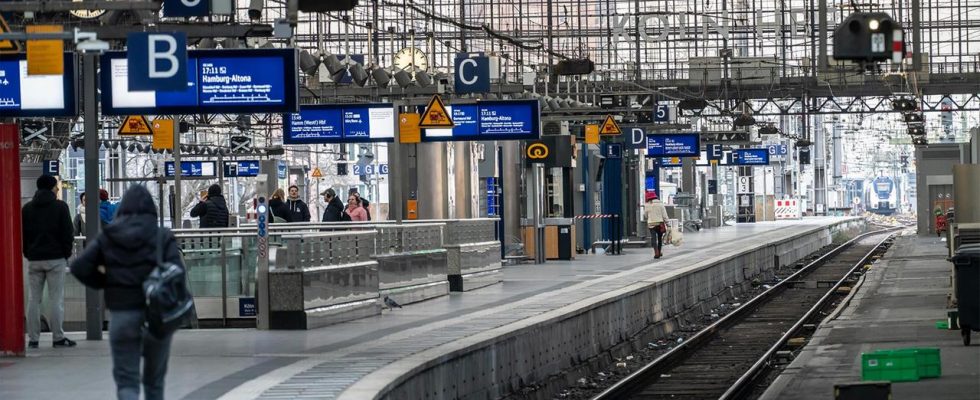The GDL train drivers’ union is paralyzing the country with strikes in its collective bargaining dispute with the railways – even though the largest union, EVG, has long had a contract. Why doesn’t the Unified Collective Bargaining Act apply?
In the collective bargaining dispute with Deutsche Bahn, train drivers are continuing their nationwide strike today, causing disruption across the country. “The emergency timetable with a greatly reduced range of journeys in long-distance, regional and S-Bahn traffic continues to apply,” said Deutsche Bahn. Around one in five trains is used in long-distance transport.
There are still extensive restrictions in regional transport, which vary greatly from region to region. The company Transdev, which operates regional trains in the northwest, Saxony and Bavaria, among others, is also on strike. According to railway spokeswoman Anja Bröker, there are no long queues or overcrowded trains. “We have the feeling that the passengers have gotten used to the GDL strike,” said Bröker together Morning magazine from ARD and ZDF.
GDL doesn’t see any Willingness to negotiate at the railway
There is a strike because the train drivers’ union GDL is negotiating a new collective agreement with the railway for its members. Among other things, the GDL is calling for a reduction in weekly working hours for shift workers with full wage compensation. The railway rejects this and is not yet prepared to negotiate about it. It has offered an expansion of existing choice models for working hours. The GDL recently described this offer as a provocation.
The strike is scheduled to last until Friday evening at 6 p.m. In all likelihood, train traffic will not run as usual again until Saturday morning.
Collective Bargaining Act does not prohibit strikes
The GDL recently reported slightly fewer than 40,000 members and is therefore significantly smaller than the EVG railway and transport union, which is also active on the railways and has 180,000 members. This means that the uniform collective bargaining law actually applies. It says that only one collective agreement applies in a company. The collective agreement that was negotiated with the union that represents most of the employees in the company applies.
The law does not explicitly say that only the union that represents the most members can negotiate with the employer and go on strike. Because the right to strike is a fundamental right in Germany.
Collective agreements apply at company level
The special thing about the railway is that EVG is the largest from the perspective of the entire group, but at the railway the collective agreements apply at company level. And the group is divided into 300 so-called elective companies. In 54 of these companies, EVG is the largest union negotiating collective agreements. However, negotiations are taking place with the GDL in 18 companies – including for the train drivers.
Given this special group structure, the railway as an employer does not benefit from the Unified Collective Bargaining Act. There are even experts who say that the law has encouraged the unions’ power struggle at the railway. Because labor disputes are important for unions in order to retain or win members.
EVG even advertises for members with reference to the Unified Collective Bargaining Act. And the GDL, for its part, hardly misses an opportunity to criticize the rival union for being too “handy”.
With information from Verena von Ondarza, NDR

